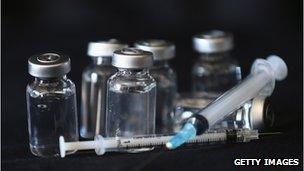West Germany 'sponsored doping in sports' - study
- Published

Allegations of doping in the former West Germany are now under scrutiny
German officials have demanded publication of a partially leaked study which alleges that West Germany engaged in systematic doping of athletes.
The full scale of sports doping in communist East Germany was revealed after German reunification in 1990.
But now there are concerns that West German officials may have encouraged similar cheating in sports.
Parts of a study of West German doping, by Berlin's Humboldt University, were leaked by German media at the weekend.
According to the Sueddeutsche Zeitung newspaper, the study says West German state officials sponsored research into performance-enhancing drugs including anabolic steroids, testosterone, oestrogen and EPO (used in blood doping).
The programme reportedly became systematic in the early 1970s.
The study, commissioned by the Federal Institute for Sport Science (BISp), was supposed to have been published last year, but that was delayed amid concerns about privacy and legal issues.
The BISp was set up in 1970 under the authority of the interior ministry.
'Worst fears'
Speaking on ZDF television news, Michael Vesper of the German Olympic Sports Union said "there were apparently research projects by medics, promoted by the BISp with tax funding", but "you can't compare it with doping to order, that is, top-down, by the state".
"We want this report to be handed to us as soon as possible, so that we can assess it," he added.
Some drugs tests were reportedly carried out on minors.
Martin Gerster, sports spokesman for the opposition Social Democrats (SPD), said "what is coming out bit by bit is worse than the worst fears we had - we want the whole truth to come out as soon as possible".
The leaks include a claim that three West German footballers in the 1966 World Cup final squad were found to have traces of ephedrine, a banned stimulant.
- Published24 April 2013
- Published23 April 2013
- Published4 September 2023